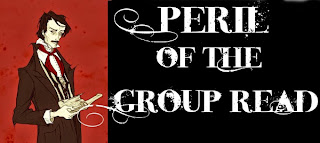The Paying Guests by Sarah Waters
Publisher: Riverhead
Publication Date: September 17, 2014
Length: 576 pages
Source: My own copy
Sarah Waters’ newest novel, The Paying Guests, immerses readers in London a few short years after War War I, an unsettling period marked by disillusionment, economic hardship, and continuing grief for lost sons, brothers, and fathers. Waters, with her signature silken prose, has crafted a fine, layered story of love and longing in a time of great change, with some page-turning plot twists along the way.
The Story: Frances Wray, at age 26, is hardly leading the life she had expected. Born into an upper class family in the genteel neighborhood of Champion Hill, she spent her early twenties in a frenzy of suffrage work and peace protests, imagining a Bloomsbury-type of future for herself with her intellectual and bohemian friends. But the Great War unleashed a chain of catastrophic losses for the Wrays—two beloved sons on the battlefield, one father to a stroke, and finally, the family’s fortune to a series of bad investments. Frances and her mother remain in their slowly crumbling house, while their money dwindles away. Frances, once a passionate free spirit, finds herself, in a sense, entombed by the old Victorian house and the weight of her mother’s expectations.
To make ends meet, Frances arranges to take in boarders, or in the polite euphemism of the time, “paying guests.” Len and Lilian Barber, a young couple of the “clerk class,” arrive to move into an apartment fashioned from several upstairs rooms. Frances, at first, finds the Barbers distasteful; Len smirks and makes crude remarks full of unnerving sexual innuendo, while Lilian, with her short skirts and lipstick, seems vaguely tacky. But soon Frances finds herself drawn to the Barbers in ways she did not expect, and, despite their class differences, she develops an intimate friendship with Lilian. As Frances becomes more deeply involved in the Barbers’ lives, however, she is pulled into a series of events that will threaten to change all of their lives.
My Thoughts: First of all, I think readers would do well to approach this novel with as little detailed information as possible about how the plot will turn, so I tried to keep the above synopsis fairly vague. I read very few reviews of The Paying Guests before embarking upon the first pages, and was pleased to find myself surprised through-out.
The Paying Guests was, for me, a compelling read, an unusual love story as well as a darkly suspenseful psychological novel. Waters doesn’t just create a setting in this book; she builds an entire world. I felt myself completely enmeshed in the domestic details of English life in the 1920s. She also skillfully creates a sense of atmospheric dread; the reader suspects something bad is on the horizon, but Waters masterfully controls the pace before unveiling the traumatic event at the heart of the plot.
Although I truly enjoyed The Paying Guests, a few things keep me from rating the novel as a 5. Waters takes, perhaps, a bit too long to build momentum in the first quarter of the book. While I drunk in her evocative, measured prose, some readers may find the novel too slow at the start. It would be a shame if readers turn away because of this; the plot intensifies about a third of the way through, and the book becomes hard to put down. I do think, as well, that the novel is overly long; some sections towards the end related to legal proceedings are needlessly detailed and could have been condensed without threatening the power of the story.
I would rate this novel 4 out of 5 stars. I’ve read only one Waters novel before, The Little Stranger, and I do think I need to delve deeper into her backlist. I have heard so many great things about Fingersmith, so perhaps that will be my next Sarah Waters. I hope that Waters, who is well-known and critically acclaimed in England, will become more widely read by American readers of literary and historical fiction.




















































